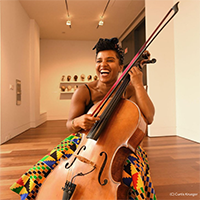Jeanne Tedrow, President & CEO, North Carolian Center for Nonprofits
The arts empower. The arts give a voice to the voiceless. The arts help transform American communities and, as I often say, the result can be a better child, a better town, a better nation and certainly a better world. Let’s champion our arts action heroes, emulate them and make our communities everything we want them to be.
–Robert L. Lynch, President, Americans for the Arts
In October, we celebrate Arts & Humanities Month. Now, more than ever, is a time to recognize and support arts and cultural organizations across North Carolina. Historically, the arts have contributed to our state’s thriving economy. The arts create jobs, generate tax revenues, stimulate consumer spending, and energize cultural tourism while creating enriching life experiences and meaningful connections for people in every community in North Carolina.
For nonprofit arts organizations to play this vital role, they need support. Very soon, executive directors and development directors will start their year-end giving campaigns and gear up for Giving Tuesday, as they seek to retain donors and attract new ones. This comes at a time when many would-be donors are newly unemployed, struggling to keep their own household budgets afloat, juggling their parenting roles alongside newly named teacher-in-residence, or striving to remain safe while being an essential worker who must leave home to go to work every day.
This only adds to the difficult situation – and while there are no easy solutions, there are strategies that may be tried. For some organizations, this offers an opportunity to pause and think about what was working, what was not working, and what needs to change in the present and then make strategic decisions about ways their nonprofits will need to evolve to survive and thrive in the future. Many have done the best they can such as reaching out to their patrons and considering ways to bring programming to a virtual format with some success.
As Nate McGaha, executive director of ARTS North Carolina, shares, “[t]he business model for almost all arts and culture establishments is based on bringing people together for a shared experience, often shoulder to shoulder with strangers. This is simply no longer an option, and digital distribution cannot replicate that experience nor the revenue it once produced.”
We see these realities reflected in comments shared by nonprofit arts organizations across the state. This summer, the North Carolina Center for Nonprofits and the State’s Office of Strategic Partnerships completed a statewide survey that highlights the difficult circumstances faced by all nonprofits in the face of COVID-19, including those in the arts and humanities. We appreciate all nonprofits who responded to our statewide survey, which provides insight into how this pandemic has impacted various nonprofit subsectors.
Like so many nonprofits, arts organizations have had to face complex and unique challenges of the pandemic. The vast majority of arts organizations that responded to the survey shared that they have lost revenue, faced staffing challenges, experienced supply problems and venue challenges, and had disruptions to their programs. These challenges are particularly acute for arts and cultural organizations since many have fixed operating expenses and budgets that are heavily dependent on earned income that has been unavailable during the pandemic. For many, it has not been feasible to transition their programs to online platforms or to downsize their physical spaces and related expenses. Recognizing where arts organizations are particularly vulnerable can help funders and the general public identify meaningful ways to help. Even before the pandemic, many arts organizations were experiencing financial and fundraising challenges. But they were able to continue through the dedication of their patrons, donors, and stakeholders.
Despite these challenges, arts organizations have shown resilience in their responses. Shana Tucker, the new executive director of Kidznotes in Durham, reflects on how this pandemic has affected her organization:

featured performing artist
at the Center's
2020 statewide conference,
Rebuilding for Resiliency.
“At Kidznotes, we made a super heroic attempt to move the music instruction programs to a completely virtual model for our K-1 and instrumental/performance classes. When we all return to onsite programming, we will continue this as a complement to our traditional approach. For me, the reality of the present is to remain fluid, that the words of our times are change and malleability. I see that our pathway forward is a combination of our past converging with our future. If not for facing the virus challenge, we would not have learned how powerful a virtual learning experience could be. During this pandemic, I am reminded of how important music is to our students and our community.
“I recognize the concern that basic needs first be met in the midst of this pandemic. Certainly shelter, housing, food, transportation, access to the internet, among other needs are critical and should be supported. But we also need and welcome support for the arts even in the face of this pandemic. The arts bring us the most joy in our ability to be creative, and when we enjoy music, theater, and all of the other creative arts, we can recalibrate.”
As nonprofit arts organizations work to recalibrate their own operations, we need to lift up the role they play in nourishing our communities. As Charles Phaneuf, president of United Arts Council of Raleigh Wake County said in a press conference hosted by the Center: "Communities throughout North Carolina need their nonprofit arts organizations to survive. Both because we're a driver of economic recovery and because the arts help us heal and rebuild."